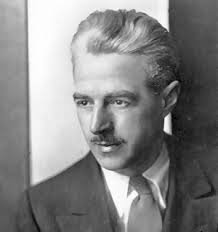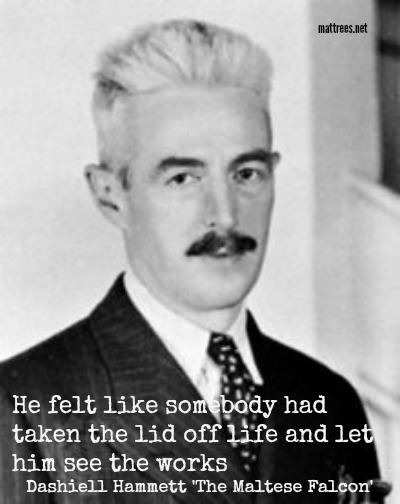How Hammett’s classic ‘The Maltese Falcon’ showed me what kind of writer to be
As an undergraduate I studied English literature at Oxford University and I read all I could find of the sort of literary criticism which made novels seem like East German economic analysis. Three years later, I hadn’t learned a thing, except that it was fine to have a room you could take a girl to without having to sneak past your mother, Guinness isn’t “good for you”, and the deputy manager at Lloyd’s Bank on Broad Street with the goatee and the bald head didn’t just look like Ming the Merciless.
Then I read Dashiell Hammett and my interest in the literary criticism side of writing evaporated. From then on, I wanted only the craft, writing about emotions, working on my writing voice and style. I wanted to make a voice for myself, the way I saw Hammett make one for himself.
Hammett’s experience as a detective made his writing real
Before he wrote, Hammett was a Pinkerton detective. What he wrote was in many senses absolutely real. I could smell the places he’d been for the Pinkertons, feel the punches he’d taken, think the way he’d had to think to outwit true criminals. I’d been reading Marxist critical theorists on Daniel Defoe and French deconstructionists whose scribblings about the “stereographic plurality of meanings” were intended to tell me that whatever I thought a book was about was, indeed, what it was about–except that it wasn’t, was it. Or was it?
It was the kind of stuff only a pretentious 20-year-old ought to like. It wasn’t going to take me far in life, and it didn’t help me figure out what I wanted to write about.
The Maltese Falcon gave me the sense of how real experiences lead a writer to the soul of his subject, and to the soul of himself. Anything but that soul isn’t worth reading about, because it’s just lies. University is where you go for other people’s lies. Novels are where you go for their confessions.
Good novelists don’t need to be liked
The best novelists are the ones who don’t care if you like them, because if you can’t handle who they are, you belong back in school where you can pretend to understand subjects that aren’t worth knowing about. Hammett did this by creating a voice for his Continental Op and (in Falcon) for Sam Spade, his heroes, that came from within. Their thoughts demonstrated the men they were.
In The Thin Man Hammett gets at this idea in this passage about lies:
The people who lie the most are nearly always the clumsiest at it, and they’re easier to fool with lies than most people, too. You’d think they’d be on the look-out for lies, but they seem to be the very ones that will believe almost anything at all.
Lawrence Block wrote a book about writing in which he, like many other writers, refers to the idea that he’s telling lies for a living. That’s what writing is to some people. What Hammett is saying here is that it’s quite the opposite. Don’t try to lie when you write, because it’s obvious. If you can’t tell the truth in fiction, your story won’t be worth a damn, and everyone will know it. Unless they’re liars too.
The real Palestinian characters in my first novels
When I began to work on my Palestine Quartet, I knew that I wanted to use real events I had covered as a journalist among the Palestinians for the previous decade. I took my characters from people I had known, and known well. I set the first book in Bethlehem, which I could see from the window of my apartment in Jerusalem, and weaved together a series of stories I had uncovered.
Everyone in the book is based on someone who stood before me and talked to me, willingly or grudgingly or with outright hostility, to tell me what they thought about the killing and corruption that tainted their town. The result was The Collaborator of Bethlehem, which won the Crime Writers Association New Blood Dagger for a first novel in 2008.
I hope Hammett would have enjoyed it. Because I wrote not only about real events, but also about true emotions that I experienced in Palestinian towns.
I continued to use that technique as I wrote more novels, always going back to Hammett as I looked for inspiration. Have a look at his books–Red Harvest is my favorite–if you haven’t already read them. You’ll be inspired too.


 Guns in thrillers: Crime writers and gun control
Guns in thrillers: Crime writers and gun control